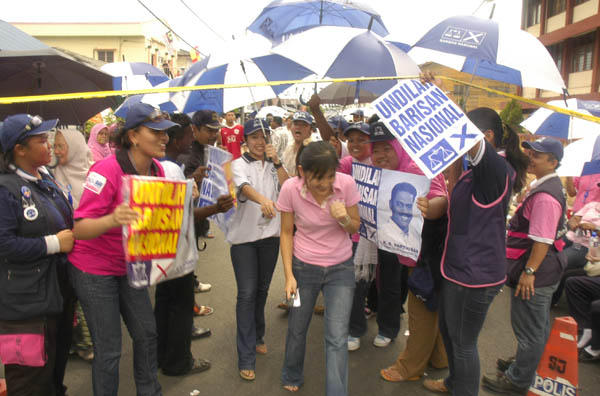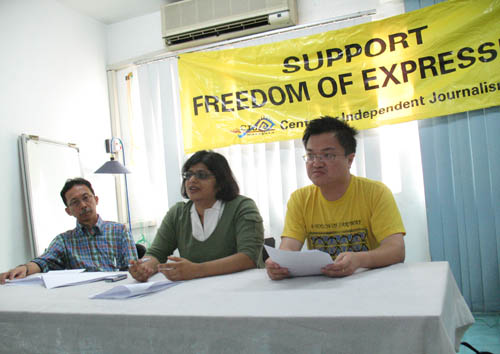By Danny Lim
dannylim@malaysiavotes.com
THREE days before polling day during the Ijok by-election in April 2007, an MCA state assemblyman, speaking on condition of anonymity, was worried about the Chinese vote.
“Those who stay here, no problem (in voting for the Barisan Nasional),” he said. “But their children… they go out (of Ijok), they hear all kinds of things.” This 20-30% of ‘floating’ Chinese voters working and living outside Ijok, he said, were exposed to alternative media, especially the internet.
The implication here is that there are only two sources of information – the traditional media that is perceived to be all pro-BN and the online media that is seen to be all pro-opposition — which is not entirely accurate.
 Restrictive laws like the Printing Presses and Publications Act (PPPA) that give absolute power to the Internal Security Minister to issue annual publication permits for newspapers and magazines, and the concentration of media ownership to politically-linked companies, have given rise to accusations of political abuse by the incumbent government.
Restrictive laws like the Printing Presses and Publications Act (PPPA) that give absolute power to the Internal Security Minister to issue annual publication permits for newspapers and magazines, and the concentration of media ownership to politically-linked companies, have given rise to accusations of political abuse by the incumbent government.
These controls have encouraged a rash of alternative sources of information on the internet – some more accountable than others – to fill the gap left by a perceived lack of confidence in traditional media.
And so it goes, creating and perpetuating an electorate going to the ballot box with information that is seen to be one part compromised, and one part not always accountable. On the scale of a general election however, traditional media outlets still hold sway in informing a nationwide electorate.
Several non-partisan civil society initiatives seek to address this problem, with the help of both BN and opposition parliamentarians. On Feb 16, the Centre for Independent Journalism (CIJ) and the Writers Alliance for Media Independence (WAMI) co-launched an effort to monitor the media’s coverage of the 2008 General Election. With support from Charter 2000-Aliran, they seek to examine news reports, study editorials, features and political advertisements to ascertain if the coverage is fair, professional, unbiased and ethical.
They will keep track of the election news coverage and critically examine whether the media – both print and electronic – have been ethical in their reporting. Their analysis will subject media coverage to three criteria: equal access to the mainstream media for all parties; fair and sufficient coverage for all parties; and the right of reply, or to respond, state a position or clarify allegations.

“Our analysis can provide the context,” said Dr Mustafa K Anuar, one of the coordinators of Charter 2000-Aliran. “For example, we’re told that opinion polls show that Malaysians do not like street demonstrations…at a glance you might not have a real understanding of this. But RTM has been showing a series of video clips linking street demonstrations with opposition parties. If we’re able to give that context, then the public will be able to say ‘Hey, it’s not just about opinion polls, they’re trying to indirectly smear the opposition parties.’”
Keeping an eye on spending
Meanwhile Transparency International Malaysia (TIM) will monitor election spending, specifically advertising costs incurred by political parties. Based on Transparency International’s initiative in eight Latin American countries in 2006 called Crinis (Latin for “ray of light”), TIM will monitor the newspapers and television to look out for advertisements of political parties.
“We will compile and record this data, estimate the costs, and see if the parties’ spending on advertising is in accordance with the rules of the election process,” said TIM president Tan Sri Ramon Navaratnam. “We will categorise according to ads that are under party headings, and ads [that endorse political parties] by other groups.”As this is the first election monitoring exercise that TIM is undertaking, the methodology needs to be worked out “as we feel our way through”. Below-the-line advertising like billboards and banners will be beyond TIM’s scope due to its own limitations. Navaratnam concedes, “I don’t want to mislead you into thinking it’s very scientific.”
Monitoring the electoral process
This election will be the first time that Malaysians For Free and Fair Elections (Mafrel) has official accreditation by the Election Commission (EC) to conduct overall monitoring. Mafrel’s monitoring ambit includes studying the electoral roll, the conduct of the parties, the media, the government and the EC, right down to the polling and counting of votes.
Mafrel’s approach has been to be engage the EC constructively, rather than to take to the streets, according to Mafrel chairman Abdul Malek Hussin, “because of their attitude of not being open to differing opinions”.
“We are research-based observers,” he said. “We have forms, we train the observers to gather data, and we deploy them in strategic areas.”
Mafrel’s methodology adheres, as far as possible, to the International Principle on Election Observations and Code of Conduct For Election Observers, launched by the United Nations in October 2005, whilst respecting the conditions set out by the EC, which has permitted Mafrel to have dynamic observers who can move between polling centres and constituencies.
After the election, the observers will submit their reports to the Mafrel secretariat. “We come up with solutions and make recommendations in the aftermath. This can only be achieved by being officially recognised and accredited,” Abdul Malek said.
This output will be propagated via workshops and discussions with various authorities, including the EC, government, media and international organisations. It’s a long-term process that Abdul Malek recognises to be slowly incremental but sure in its progress. “We’re not talking about a mass uprising, we’re talking about building strong values,” he said. “Changing the system must be negotiated through peaceful means.”
Mafrel’s argument for enhancing democratic space is a broad-based one that necessitates this approach. It encompasses everything from the inherent flaws in the colonial legacy of the first-past-the-post electoral system, the geographical division of constituencies (which allows for low-population rural seats to be equivalent to high-density urban seats), right down to the lack of intellectual debate.
Ultimately these monitoring efforts aim to feed more useful information to the public so that voters can make more informed choices. The extent to which this information is freely disseminated determines its success. What a growing number of BN and opposition parliamentarians are realising is that it is as much in their own political interest to push for greater media freedom, as they face an increasingly aware and conscious electorate.
Media law reform
Wami chairman Wong Chin Huat cites BN parliamentarians like Umno’s Kota Bharu member of Parliament (MP) Datuk Zaid Ibrahim and MCA’s Kota Melaka MP, Wong Nai Chee, who have committed support for media law reform.
“[The MPs’ statements] have not resulted in anything substantial, but at least the debate has been brought to the mainstream,” said Wong (of Wami), who also chides certain opposition MPs for dismissing media law reform as a singular issue that does not win votes.
“While BN backbenchers may have some reservations in tendering a private member’s bill, the opposition [MPs] have no reasons to have reservations. They don’t even need to draft that. You just make a call and say that you’re going to draft an alternative to the PPPA, and you’ll have people lining up to do the job for you, and you can be the hero,” he said.
“[Parliamentarians] need to embrace and push this agenda forward, and the voters should reward those who do so,” he said.
3 responses to “Keeping close watch”
[…] Keeping close watch […]
OT would comment on below statement:
MV: Malaysia Vote
MV> ‘……. there are only two sources of information – the traditional media that is perceived to be all pro-BN and the online media that is seen to be all pro-opposition — which is not entirely accurate’.
OT> There is a control of license that maneuver ones’ mindset. OT observes that many reporters from mainstream medias are aware of what happening in electronic medias.
But there is no evidence show which medias have pro- sentiments either on BN or opposition.
Undoubtedly, more youngs are IT savvy as a matter of facts they are conditioning to live in such environment.
Unlike their parents, who are still relying on print medias.
It is a generation gap widely observe among Malaysian society, from two aspects we think:
One, cultural disparities
Two, broken in family values
I have your feed embedded in this post:
http://pray-for-malaysia.blogspot.com/2008/02/citizens-initiative-to-monitor-medias.html
Peter (Blog*Star)
http://pray-for-malaysia.blogspot.com/
http://digitalcandlelightvigil.blogspot.com/
(reluctant protest blogger)